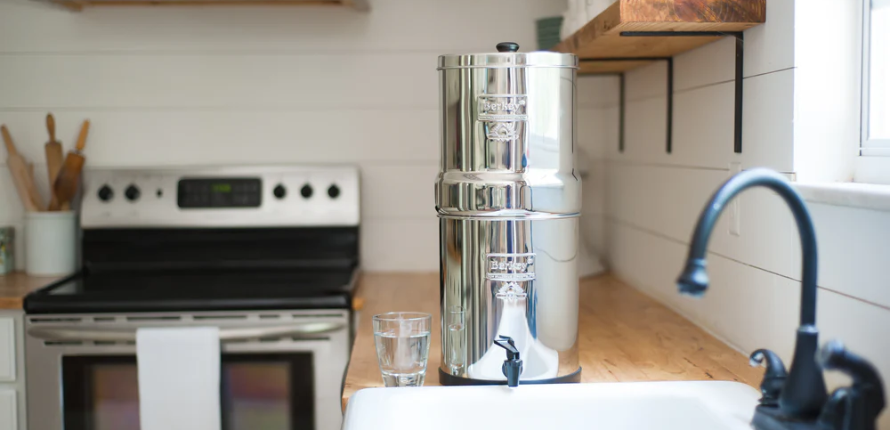Why More Homes Are Turning to Berkey for Cleaner Water Every Day
Explore a thorough look at Berkey water filtration systems, their strengths, limitations, and how they stack up for everyday use.

Tap water is a basic, often-overlooked part of daily life. But lately, more people are paying attention to what’s actually in it. With headlines raising concerns about PFAS, heavy metals, and unfiltered runoff, interest in home-based water filtration system options has surged. That’s where Berkey water filter systems enter the picture. Known for their gravity-fed design and wide contaminant removal claims, these units have become a go-to for many households seeking simplicity and peace of mind.
But hype aside, how do they hold up in real-world use? Let’s unpack what sets Berkey filters apart and what to keep in mind before diving in.
How the Systems Work
Every Berkey water filtration system, from the compact Go Berkey to the massive Crown Berkey, operates on the same core principle: gravity filtration. Water poured into the top chamber passes through proprietary Black Berkey filters and drips into the lower chamber for storage. No electricity, plumbing, or pressurized systems are involved.
That simplicity is a big part of the appeal. Berkeys aren’t just for kitchens, they’ve been spotted at campsites, in RVs, and even in emergency kits. They’re designed to be adaptable, mobile, and low-maintenance, especially in situations where traditional systems aren’t an option.
Each unit accommodates between one and eight Black Berkey filter elements. More filters mean faster flow, not cleaner water. They all use the same technology, so the level of purification is consistent across sizes. It just takes less time the more filters are installed.
What’s Being Filtered Out
The range of contaminants that Berkey filters claim to remove is impressive. According to independent lab tests posted on their official site, Berkey water purifiers significantly reduce:
- Chlorine, VOCs, and pesticides
- Pathogenic bacteria and viruses
- Heavy metals like lead, mercury, and arsenic
- PFAS ("forever chemicals") to undetectable levels
- Pharmaceuticals and petroleum byproducts
That level of purification makes these systems especially useful for filtering rainwater, well water, or untreated freshwater in outdoor settings. And the standout is that all this happens without electricity.
But it’s not without gaps. Some contaminants, including nitrates and water hardness minerals, remain. To reduce fluoride and arsenic, you’ll need to add optional post-filters. These additions can slow flow considerably and require more frequent replacement.
A Certification Conversation
One of the more controversial issues around Berkey water filter systems is the lack of certification. Despite performing tests that appear to align with NSF/ANSI standards (particularly Standard 53 for health-related contaminants), the company has never submitted its systems for official NSF certification.
Why? According to Berkey’s statements, the cost and complexity of certifying multiple configurations would be prohibitive, particularly for a product line that includes many custom setups. That explanation hasn’t satisfied all critics.
So what’s the implication for users? If third-party certification is non-negotiable, other water filtration system brands may offer more peace of mind. But for others, the breadth of Berkey’s testing may be more than enough.
What Independent Reviews Say
Real-life use tells a mixed story. On forums and social platforms, many users praise the taste of Berkey-filtered water and the long lifespan of the filters. One pair of Black Berkey elements can filter up to 6,000 gallons before needing replacement.
Others raise concerns about consistency. Some report clogged filters, slow flow rates, and difficulties priming new elements. Still, these frustrations tend to be more about the learning curve and maintenance than the core filtration itself.
A few independent reviewers even ran their own at-home water tests, some confirming that lead and PFAS levels dropped significantly, while others noted trace amounts remaining. Results may vary depending on the water source, how well the system is maintained, and whether the filters are genuine.
Which Berkey Should You Get?
Choosing the right system is all about size, flow rate, and use case. Here’s a quick breakdown:
Go Berkey
- Serves: 1 person
- Volume: 1 quart
- Best for: Hiking, solo travel, emergency kits
Travel Berkey
- Serves: 1–3 people
- Volume: 1.5 gallons
- Best for: Small homes, RVs, compact counters
Big Berkey
- Serves: 1–4 people
- Volume: 2.25 gallons
- Best for: Everyday kitchen use
Berkey Light
- Serves: 1–5 people
- Volume: 2.75 gallons
- Best for: Those preferring BPA-free plastic
Royal, Imperial, Crown Berkey
- Serves: Up to 12 people
- Volume: 3.25–6.5 gallons
- Best for: Large households, offices, events
Cost and Value Considerations
Berkey water filter systems are not the cheapest upfront, with prices ranging from $234 for the Go Berkey Kit to nearly $500 for the Crown Berkey. Filter replacements also run higher than average, though less frequent. So what are you paying for? Longevity and versatility. One set of filters can last years, depending on usage, and the systems work almost anywhere, making them a solid long-term investment for those wanting off-grid readiness or disaster prep options. Still, price-conscious buyers may want to explore other options before committing.
Comparing the Alternatives
There’s no shortage of water filter systems on the market. Under-sink reverse osmosis systems like APEC or iSpring offer high-capacity, multi-stage filtration and official NSF certification. Pitcher systems like ZeroWater are budget-friendly and easy to use, though their filters require more frequent changes and limited capacity. Countertop competitors like AquaTru offer speed and efficiency, often using reverse osmosis and UV for added layers of protection, but they require power and plumbing. In the end, each option brings trade-offs between cost, certification, mobility, and ease.
Berkey water filters don’t suit everyone but for those prioritizing portability, filter longevity, and strong contaminant reduction in a non-electric setup, they present an undeniably practical solution. Their minimalist design has become a recognizable kitchen fixture, and the flexibility in water source makes them a contender in emergency readiness. Still, the lack of official certification, slower flow rates, and the price tag mean it’s important to weigh your priorities. For some, combining a Berkey with a certified under-sink system or faucet filter may offer the best of both worlds, convenience, speed, and that added reassurance from verified testing.
For more on outdoor living, follow VestureDebate.
Recent Blogs
-

Are Hoodies Enough for Women’s Winter Workout Clothes?
Winter workouts can be challenging. The freezing temperature and the constant challenge of staying motivated make it tougher. However, the right women's winter workout clothes can make a big difference in how you feel, how you perform, and how far you go in the coldest conditions.
-

Tablet vs. Gummy: What’s the Better Vitamin for Kids?
Buying the right vitamin for kids is really an important decision. This decision can impact their daily routine either in a good way or a bad one. Parents often are stuck between two prominent vitamins—tablet and gummy—to figure out which offers the best balance and ease of consumption.
-

How OG by Brez Is The Best Non-alcoholic Drink
If you are looking for non-alcoholic drinks, then Brez OG is the best one to get. Take a look at this blog and find out how Brez OG is the best non-alcoholic drink that you should try.
-

How to Make Your Shoes Last Longer: Care and Maintenance Tips
Caring for shoes is the most difficult task you can ever do. It requires a lot of patience and hard work to clean it. However, if you are looking for other easy and simple ways, then trust me, this blog is a blessing in disguise for you. Take a look at this blog and make your life easier and your shoes cleaner.
-

How to Reduce Food Cravings Without Feeling Low
Cravings can make healthy eating feel like a constant struggle. Well, the good news is, it's possible to reduce food cravings without sacrificing your mood or energy. You can easily regain control and feel your best every day by using smart strategies.